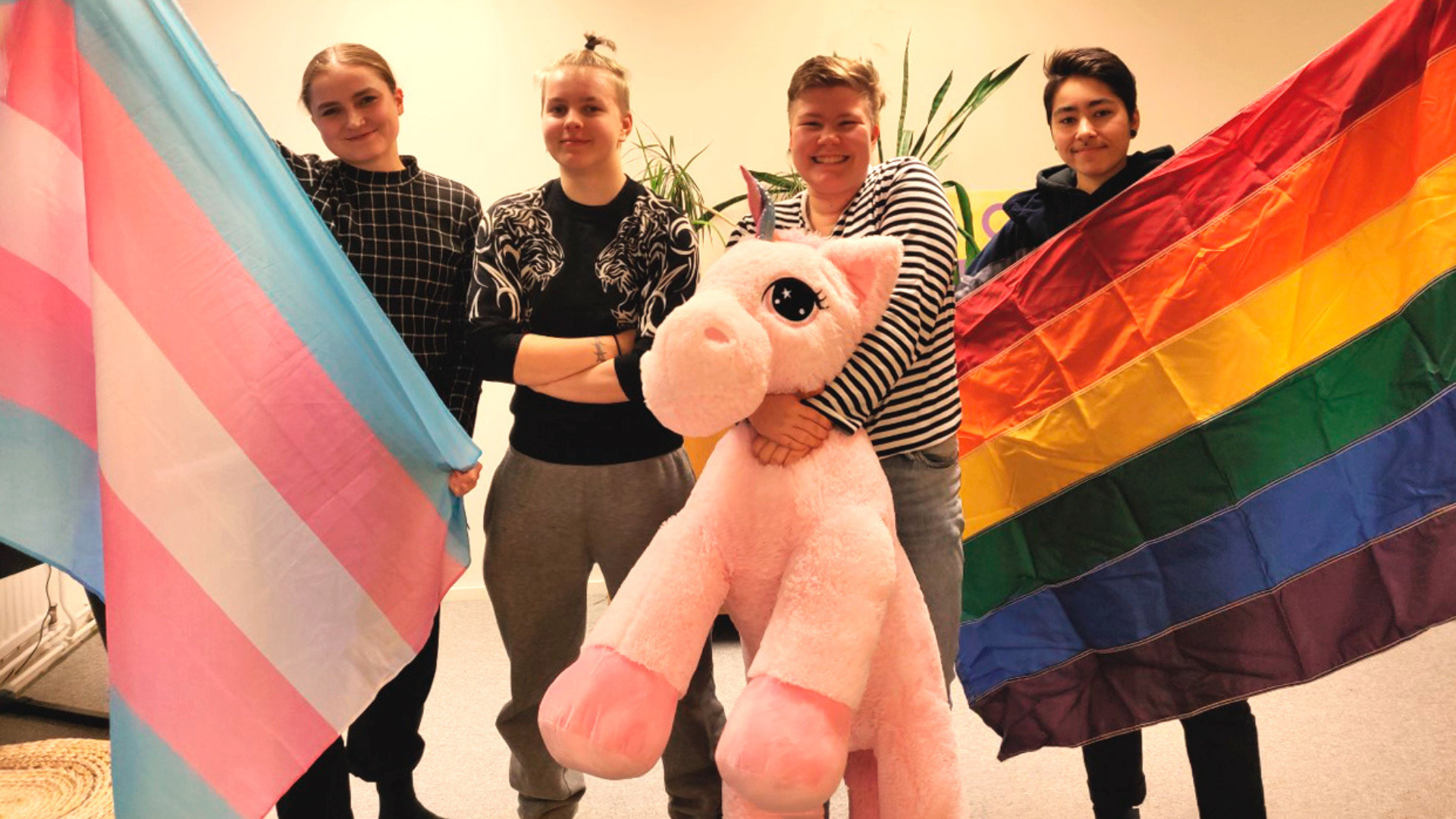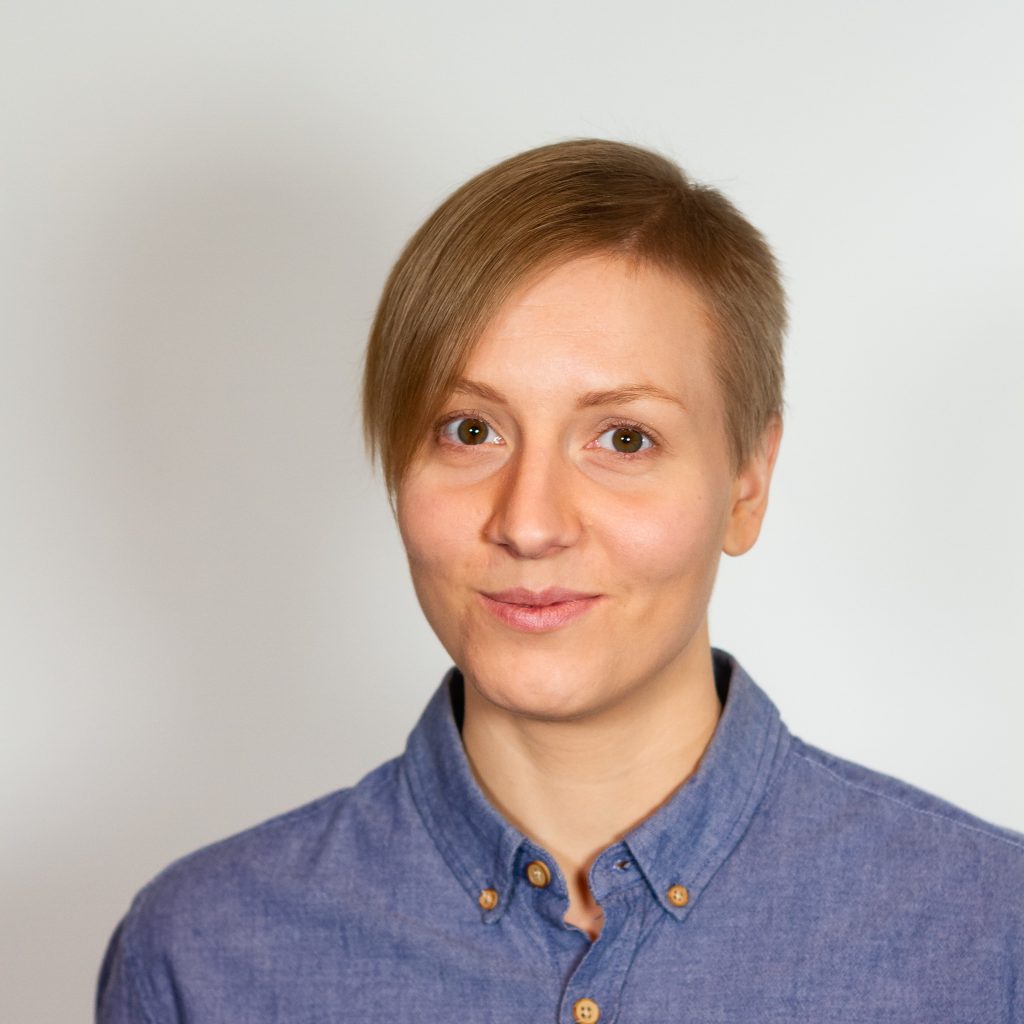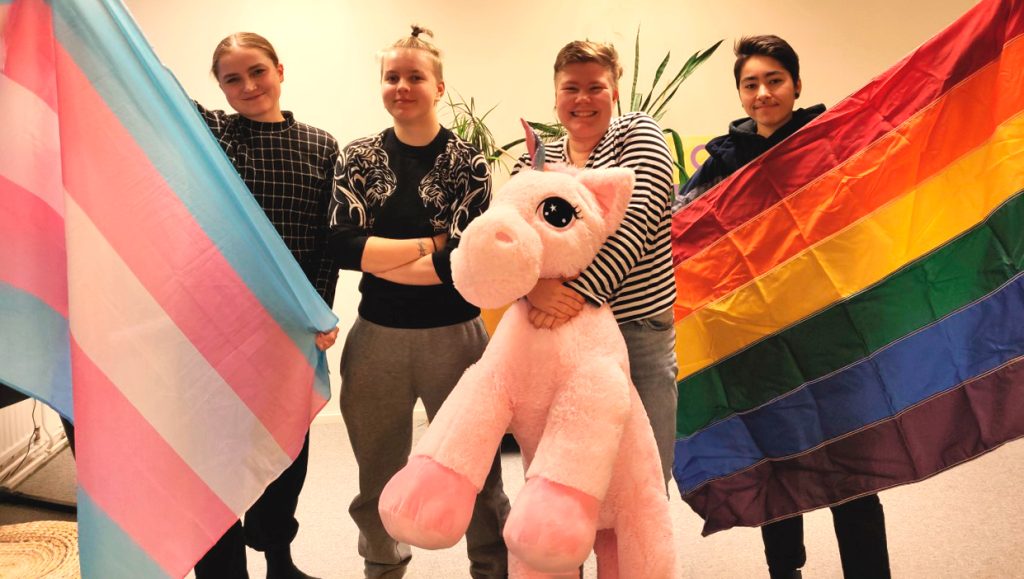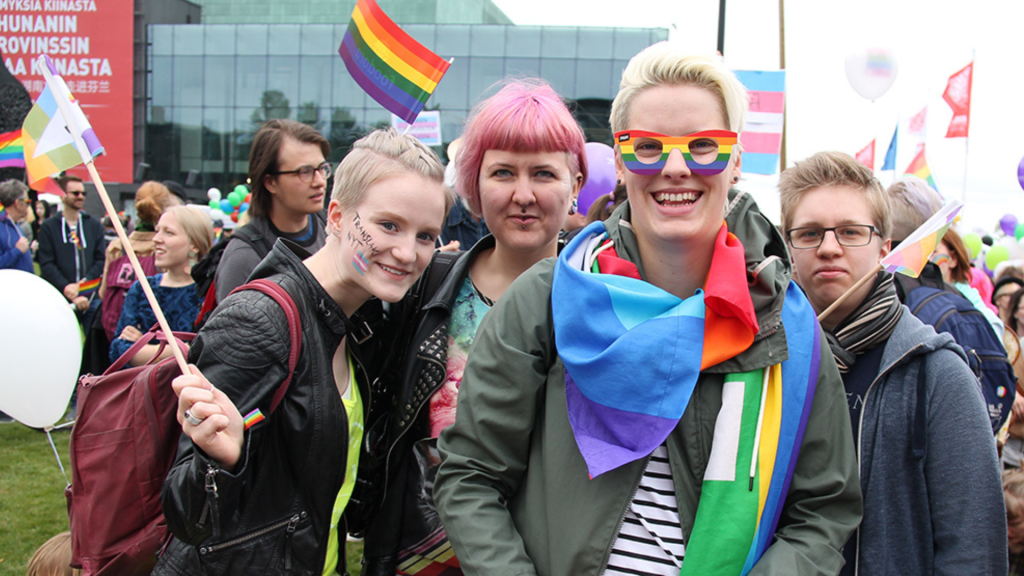
Engaging, connecting, and empowering young people has been one of the key priorities within the youth work strategy in Europe. On the other hand, exclusion remains a challenge. Whether it’s based on economic status, race, gender, or sexual orientation. During the European year of Youth, all the stakeholders are looking for good practices. This time, we’ll be talking about tackling social and legal discrimination amongst LGBTIQ+ youth (lesbian, gay, bisexual, intersex, queer and more).
We’re in Helsinki, in Seta, a local organization advocating for LGBTIQ+ rights in Finland.
Teija Ryhtä (they/them) works as the Youth Work and Participation Expert. Their tasks include training and consulting professionals and volunteers who work with young people in different contexts, like schools, youth work, health care, social services etc. Teija provides them with the tools and understanding needed to provide safe and sensitive services to LGBTIQ+ youth. They also develop safer space practices and provides trainings about them, and acts as one of SETA’s point of contacts for anti-harassment.
Teija: “Seta – LGBTIQ+ Rights in Finland is an NGO founded in 1974. Seta aims for an equal society and individual welfare that includes everyone, regardless of sexual orientation, gender identity and gender expression. We want to change legislation and attitudes through education and information and by co-operating with authorities and political decision-makers. Seta works with the whole society and collaborates with a wide range of institutions and governmental bodies. Our work and activities are based on human rights and self-determination.”

“Seta’s Gender Diversity & Intersex Centre of Expertise offers services to all trans and intersex people, people pondering their gender, and to their families and loved ones. The staff, peer group activities, and other events organized by volunteers are offering support through counseling and therapy. Gender Diversity & Intersex Centre of Expertise provides information on gender diversity to different target groups. Services are free of charge, except for professional trainings.
Seta is an umbrella organisation for 34 member organisations. These organisations work either locally or nationally promoting LGBTIQ+ rights or the rights of a specific minority, e.g. transfeminine people (Transfeminiinit) or senior LGBTIQ+ people (Sateenkaariseniorit).”
Teija: “Seta offers training, materials and consultation to professional and volunteer-led organisations working with young people. In Finland, all cities and municipalities provide their own youth work services. Numerous NGO’s often supplement activities.
Seta aims for all youth work to become sensitive to LGBTIQ+ young people’s needs. The Finnish law also requires this through the Non-Discrimination and Equality Acts, as well as the Youth Act. The organisation also recognises the need for LGBTIQ+ specific youth work, such as professional- or volunteer-led peer groups and other activities.
Seta supports its member organisations in hosting such activities locally by training volunteer group leaders and providing materials, monetary support, and the possibility to consult Seta’s professionals. Seta also encourages its member organisations to co-operate with municipalities and other NGOs to develop the best possible services for LGBTQ+ youth in the local context.“
“Seta’s youth work team currently consists of two permanently employed experts and two project workers. Lotte Telakivi works as the Youth Policy and Advocacy Expert, focusing on promoting the rights and needs of LGBTIQ+ children and young people in legislation and in the public discussions, as well as in the numerous networks around youth work, the Rights of the Child and other relevant topics.
The project workers are implementing a three-year project funded by the Ministry of Culture and Education. They’re focusing on improving the well-being of LGBTIQ+ youth, especially after the negative effects of the pandemic. This project offers an online youth club on Discord, where LGBTIQ+ young people can meet peers and discuss with the project workers, who support them and guide them to other services if needed. The project also hosts a network of youth workers who implement LGBTIQ+ specific youth work in municipalities. The network provides support for the professionals and exchange of good practices.“
Teija: “Seta’s action plan includes many different areas, such as advocacy, communications, training and administration. The Ministry of Social Affairs and Health funds part of Seta’s work, and the Ministry of Culture and Education funds Seta’s youth work.
Seta’s youth work team creates its own action plan, which consists of a few chosen topics to focus on each year. In 2022, those topics were LGBTIQ+ young people’s poor mental health, socioeconomic status and the risk of violence towards LGBTIQ+ youth. We recognise these as some of the biggest risks for LGBTIQ+ young people’s well-being.
There are different ways that we approach these topics. We do this by publishing texts and other materials, doing advocacy work, and providing in-depth trainings, as well as creating new contacts to relevant organisations, and strengthening cooperation with the existing partners. We also aim to gather new data on our chosen topics by cooperating with researchers as well as students who work with LGBTIQ+ topics in their theses.”

“In a year with elections, Seta’s youth work focuses advocacy on the election topics. For example, Finland had its first county elections to elect the councils for the new wellbeing services counties in 2022. Seta’s youth work provided information on the needs of LGBTIQ+ youth to the prospective council members before the elections. We also continue to contact the elected council members as they develop the new systems of wellbeing services.
Seta also hosts a youth committee consisting of 10 to 12 young volunteers. The youth committee members receive training on human rights advocacy and communication, and they plan their own activities each year.
They provide the voice and experiences of LGBTIQ+ youth both internally to Seta’s experts and externally to Seta’s networks. For example, they participate in different workshops and hearings, give comments and statements, and they’re active on social media. Furthermore, they host an annual capacity building weekend for young people and sometimes other events, like get-togethers or discussion panels.
New volunteers join each year for a two-year term. This means that each year the group consists of both new and more experienced members to ensure peer learning.”
Teija: “Seta’s Youth Policy and Advocacy Expert works within numerous networks and policymakers to promote the rights and needs of LGBTIQ+ youth. We make sure to comment on each new legislative bill, as well as any administrative paper or proposal concerning young people. Through this type of advocacy, we were able to e.g. include an LGBTIQ+ specific action in the National Child Strategy.
We influence the attitudes of professionals, policymakers as well as the wider public by creating positive representation of LGBTIQ+ youth. We do this through social media posts, videos and articles. Furthermore, we also have a strong foundation to lean on in the Finnish Non-Discrimination and Equality Acts, the Youth Act and the Rights of the Child, which recognises LGBTIQ+ children and youth as a vulnerable group. We promote self-determination and norm-awareness to tackle the narrow social norms associated with gender, sexual orientation, bodies and relationships.”
Teija: “In my trainings I’ve been using a list outlining the competencies needed to provide either LGBTIQ+ friendly or LGBTIQ+ specific youth work. To make general youth work LGBTIQ+ friendly, youth workers need to have a basic understanding of the diversity of gender and sexual orientation. They need a basic understanding of norm-awareness as well as tackling discrimination and harassment.
To make general youth work LGBTIQ+ friendly, youth workers need to locate and eliminate the things that prevent LGBTIQ+ young people’s participation. These can be for example groups, toilets and changing rooms that enforce the gender binary, or heteronormative practices/policies. Youth workers should listen to LGBTIQ+ young people with care and find out how to develop their services to meet their needs.

Youth workers who create and work in programs that support LGBTIQ+ youth obviously need a bit more tools and skills than the ones mentioned above. A higher level of understanding the diversity of gender and sexual orientation is needed, as well as ability to recognise the challenges LGBTIQ+ young people face in the wider society and with their families. More understanding of the development of both gender identity and sexual orientation is also needed, and the ability to recognize the questions and worries young people have regarding their identities.
Youth workers need to be aware of both the specific services available to LGBTIQ+ youth, like services related to transitioning and sexual health. They also need to be aware of the norms, structures and laws that effect their lives locally and nationally. Young people should be able to participate in developing LGBTIQ+ specific youth work according to their needs. And youth workers should advocate for them within the organisation as well as in the wider society.”
Teija: “LGBTIQ+ youth are at a risk of psychological as well as physical violence both in school and at home. The biennial School Health Promotion study shows this risk to be higher for LGBTIQ+ youth than their peers. Actions are needed to prevent these risks and to provide sufficient support to the young people who have experienced violence. The risk and experiences of violence are factors contributing to minority stress and its negative effects to mental health.
LGBTIQ+ young people report discrimination and fear of discrimination as a reason to withdraw from health and social services they are entitled to. This naturally creates more risks for their mental and physical health. Challenges with parents and other caregivers create unstable living and housing situations. The 2020 report on FRA’s EU LGBTI Survey shows that LGBTIQ+ young people are at high risk of experiencing homelessness.
These are all so called wicked problems, which are hard to solve on one level. They demand both structural and grass-roots level interventions. Youth work should provide special support to LGBTIQ+ youth to compensate for the risks and vulnerabilities that affect their wellbeing.
There are inequalities between regions and municipalities on whether LGBTIQ+ friendly or specific services are being offered and funded at all, but as a positive development, more and more municipalities recognise the needs of LGBTIQ+ young people. Still, resources are often scarce and the LGBTIQ+ specific work might rely on just one or a few professionals. Training and an adjustment of attitudes is often needed for the whole organisation to commit to providing LGBTIQ+ friendly services throughout their work. Furthermore, LGBTIQ+ topics need to be included more comprehensively in the basic training of youth work, social work and healthcare professionals.“
Teija: “Seta is a member of ILGA-Europe, TGEU and IGLYO. These link us to the network of LGBTIQ+ organisations around Europe. The chair of Seta’s youth committee participates in IGLYO’s Annual Member’s Conference with one of the youth work experts.
Seta has participated in many Erasmus+ and Youth in Action projects. We try to provide opportunities for international experiences for our youth committee members, other young LGBTIQ+ people as well as our youth workers. IGLYO’s Activist Academy and various Erasmus+/YiA activities have offered new experiences, friends, and networks as well as new and improved tools and skills for human rights activism for our young people. For Seta’s youth work experts, European collaborations offer the chance to exchange best practices and participate in peer learning. We appreciate these opportunities and wish to continue collaborating on the European level.”
For further information and resources visit www.seta.fi.